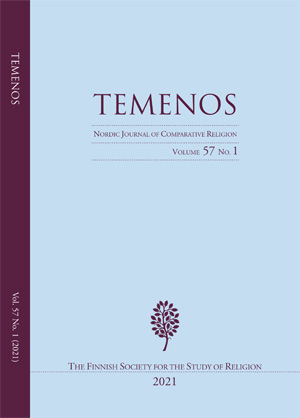The Diminishing Importance of Fate and Divine Femininity During the High and Late Roman Empire
DOI:
https://doi.org/10.33356/temenos.97345Keywords:
Fate, technology of self, Michel Foucault, free will, femininityAbstract
Weaving and femininity are historically intimately connected with
the concept of Fate. In antiquity Fate was portrayed as a powerful
female principle controlling the cosmic system humans inhabited.
However, as the antique religious world gave way to a new era,
the role of Fate subsided under Christian dominance. This article
examines how this change played out, and how the worldview that
won prominence as Christianity prevailed gradually lost touch with
the presence of powerful female cosmic principles. It shows that the
disappearance of Fate from the prevailing world was seminal in the
birth of a new ‘technology of the self’. In conclusion, the article places
the disappearance of Fate in the context of a discussion of how the
view of the self changed in the aftermath of Christianity, which had
become dominant. This discussion is related to the scholarship of
Peter Brown, among others, as well as a newly published posthumous
work by Michel Foucault (2018).

Downloads
Published
How to Cite
Issue
Section
License
Copyright (c) 2021 Paul Linjamaa

This work is licensed under a Creative Commons Attribution 4.0 International License.
Author's Guarantee
- The Author acknowledges that the Work will be publicly accessible on the Internet and that such access will be free of charge for the readers.
- The Author guarantees that the Work is her/his original work that has not been published before and cannot be construed as copying or plagiarism. Furthermore, the Author confirms that the Work contains no statement that is unlawful, defamatory or abusive or in any way infringes the rights of others.
- The Author confirms that she/he has secured all written permissions needed for the reproduction in the Publication of any material created by a third party.
User Rights
Under the CC BY 4.0 license, the Author/s and users are free to:
- Share — copy and redistribute the material in any medium or format,
- Adapt — remix, transform, and build upon the material for any purpose, even commercially,
- However, the Work must be attributed to the original Author and source of publication.
The license of the published metadata is Creative Commons CCO 1.0 Universal (CC0 1.0)
Author Rights
The Authors maintain the right to:
- copyright, and other proprietary rights relating to the Work,
- the right to use the substance of the Work in future own works,
- the right to self-archiving/parallel publishing (publisher's PDF allowed).
Rights of Publisher
- The Publisher reserves the right to make such editorial changes as may be necessary to make the Work suitable for publication in the publication, e.g. style of punctuation, spelling, headings and the like.
- The Publisher will publish the Work if the editorial process is successfully completed and reserves the right not to proceed with publication for whatever reason.
- The publication entitles the author to no royalties or other fees. This agreement will be governed by the laws of Finland.






